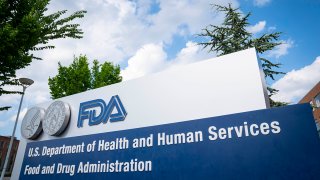
The Food and Drug Administration is facing backlash over its approval of a genetic test intended to determine if a person is at increased risk for opioid addiction.
The test, called AvertD, was approved by the FDA in December. It detects a handful of genetic markers that the manufacturer, California-based SOLVD Health, claims are associated with opioid use disorder. It’s meant to be used before a person is prescribed an opioid for the first time; for example, ahead of a surgery that a doctor may prescribe a short course of opioids for recovery.
It’s a promising test, in theory: An opioid prescription, even short-term, can be a path to addiction for some people.
The opioid crisis in the United States has been responsible for almost 645,000 deaths over the last two decades. In 2022, about 6.1 million people in the U.S. were reported to have an opioid use disorder, according to the Substance Abuse and Mental Health Services Administration.
Get Boston local news, weather forecasts, lifestyle and entertainment stories to your inbox. Sign up for NBC Boston’s newsletters.
The agency’s clearance of AvertD, however, went against the advice of its own independent advisory committee, which overwhelmingly voted against approval in 2022 because of concerns that the test may fail to identify people at risk for opioid use disorder, potentially leading to overprescribing.
In a letter addressed to FDA Commissioner Robert Califf dated Thursday, a group of doctors and researchers called on the agency to revoke its approval, saying the test doesn’t predict opioid use disorder “any better than chance.”
“This test will make the opioid crisis worse,” said Dr. Andrew Kolodny, medical director of opioid policy research at Brandeis University in Massachusetts and one of the those who signed the letter. “It will contribute to overprescribing, it will contribute to an increased incidence of opioid use disorder. In other words, more people becoming newly addicted to opioids.”
U.S. & World
The risks of getting it wrong
The authors of the letter take particular issue with SOLVD Health’s claim that its test can accurately predict a person’s risk for opioid addiction using 15 genetic markers.
Getting it wrong has consequences: A test that fails to identify a person at risk may give both the patient and the doctor a false sense of security about opioid use, the authors wrote. On the other hand, mislabeling a patient as at risk could lead a doctor to refrain from prescribing opioids that the patient needs, while also burdening them with a highly stigmatized medical condition.
The FDA and SOLVD Health did not immediately respond to requests for comment.
In the FDA’s approval statement in December, the agency said it cleared the test because the opioid crisis calls for “innovative measures to prevent, diagnose and treat opioid use disorder,” adding that it worked with SOLVD Health to address the advisory committee’s concerns.
Many in the scientific community, however, are deeply skeptical that a person's risk of opioid use disorder can be predicted based on only a handful of genetic markers, said Dr. Katherine Keyes, a professor of epidemiology at the Columbia University Mailman School of Public Health in New York.
Addiction is a “complex trait,” she said, and involves a number of other factors besides genetics, including socioeconomic status and a person’s exposure to a substance.
“We know the risk of OUD increases with the dose and duration of an opioid prescription,” Keyes said, using an acronym for opioid use disorders. “Receiving an opioid prescription remains one of the strongest risk factors for the development of opioid use disorder.”
“You’re not going to find a genetics professor in the United States or anywhere that would say using these 15 genetic markers will tell you anything,” Kolodny said.
Dr. Adam Gordon, a professor of medicine and psychiatry at the University of Utah School of Medicine, voted against AvertD’s approval on the FDA’s advisory panel in 2022. He said that even the agency has acknowledged the risk of using such a test.
In briefing documents published ahead of the advisory committee meeting, FDA staff wrote that genetic risk “may not be the biggest factor” for opioid use disorder.
And in a release for AvertD’s approval, the FDA said the main risk associated with the test is false positives and false negatives.
In its application for approval, SOLVD Health gauged how effective its test was based on how well it could weed out false negatives and false positives, using measures known as sensitivity and specificity.
A highly sensitive test accurately identifies people with the condition, minimizing false negatives, while a highly specific test accurately rules out people without the condition, minimizing false positives, said Dr. Andrew Saxon, a professor of psychiatry and behavioral sciences at the University of Washington School of Medicine.
“If your specificity were 75%, it would mean a quarter of the people who you identify in the test as possibly having this disorder did not have this disorder,” he said.
SOLVD Health said in its application that AvertD had demonstrated a sensitivity of about 82% and a specificity of about 79%.
Those numbers suggest that roughly 1 in 5 results would be false negatives and roughly 1 in 5 would be false positives.
“I think the product has the potential to do harm,” Gordon said.
As part of AvertD’s approval, SOLVD Health is required to provide training to health care workers to ensure that the test is being appropriately used. The company will also need to run a large-scale study further assessing the test's effectiveness.
The FDA has a history of approving products that its advisory committees say lack sufficient evidence on their safety or effectiveness.
In 2021, for example, the agency approved Biogen’s Alzheimer’s drug Aduhelm despite its advisory committee rejecting the drug, saying that there wasn’t enough evidence that it worked.
The company took the drug off the market earlier this year.
This story first appeared on NBCNews.com. More from NBC News:



